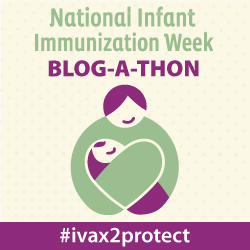Breastfeeding and vaccinations protect your baby in different ways
© 2017 Roy Benaroch, MD
“Since I’m nursing my baby, she’s getting all of the antibodies in my breast milk. Doesn’t that protect her the same way vaccines do?”
There are antibodies in breast milk, and they can help protect your baby from some kinds of infections. But those kinds of antibodies are different from the ones your baby will make herself after vaccinations. Breastfeeding contributes to one kind of protection, but the protection from vaccines is more powerful and longer-lasting.
Antibodies (also called “immunoglobulins”) are proteins that are part of your immune system. They work by attaching to invading microorganisms and viruses, which helps signal your immune system to attack. Antibodies have to be specific to each kind of infection—one antibody doesn’t fight multiple germs—and your immune system learns how to make different antibodies based on your body’s exposures to infections.
There are two ways for your baby to get antibodies. She can get them passively, from mom, either across the placenta or via breastmilk. Both are important. Placental antibodies are IgGs, which circulate in the blood. These kinds of antibodies help fight off invasive diseases. After a baby is born, placental IgG antibodies fade away over several months. Moms can boost their own ability to give these IgGs by being vaccinated, themselves, during pregnancy (that’s why moms should get influenza and pertussis vaccines while they’re still pregnant.) Breast milk contains a different kind of antibody, IgAs, which aren’t found in the blood. They are a part of intestinal and respiratory mucus, protecting people from infections before they get to the blood. The effect of these IgA antibodies in breastmilk is especially important in the developing world, where safe water and food is harder to find, and where moms have especially high titers of their own antibodies from ongoing infectious exposures.
The other way for babies to get antibodies is to make them on their own. To learn to do this, they must either be exposed to the infection, or get an immune-boosting “glimpse” of the infection by receiving a vaccine. That’s the point of vaccines: to allow someone to make their own strong, protective antibodies without the risk of having to suffer through the disease. These antibodies, made after “active immunization”, are of very high titers and are long-lasting – in some cases, for a lifetime. They’re much more protective than the passive antibodies gained across the placenta or through breast milk.
Bottom line: families can help protect their babies from infection in many ways. Sick people should be kept away from newborns. Moms should get their own recommended vaccines. Nursing can help (though in the developed world, the impact of nursing on infections is modest.) And babies should get their own vaccines, as recommended, on schedule, to get the best possible protection.
Explore posts in the same categories: In the news, Medical problemsTags: breastfeeding, immunizations, nursing, vaccinations
You can comment below, or link to this permanent URL from your own site.
April 25, 2017 at 7:34 am
Thank you! This was very informative. We vaccinated our oldest children, but then went through a time where we were influenced against vaccinations. Since thinking it over and studying more we have come to the conclusion again that they are good. After all, that is the only reason small pox, diphtheria etc. have been basically wiped out. Our children who were not immunized picked up whooping cough. That included a four month old breast fed baby.
LikeLike
April 25, 2017 at 12:48 pm
Dr. Roy, I don’t know if you’ve heard but there’s a measles outbreak in the Twin Cities right now. The last count from the health department was 20 kids under 5 infected, 16 who definitely haven’t had the MMR shot.
LikeLike
April 25, 2017 at 1:19 pm
Erin is referring to a large outbreak that’s still spreading among the Somali community there in Minnesota. They had been “targeted” by anti-vaccine propagandists, who seem to have slithered away now that measles has (predictably) struck.
https://mic.com/articles/174489/anti-vaxxers-targeted-minnesota-s-somali-community-now-they-have-a-measles-outbreak#.pDQqSjUej
LikeLike
April 25, 2017 at 1:24 pm
That’s a really interesting article, I actually was wondering about the propaganda behind it, since most of the local outlets are just generally talking about anti-vaxxers being part of the problem.
LikeLike
October 23, 2017 at 9:45 pm
[…] Breastfeeding and vaccinations protect your baby in different ways […]
LikeLike